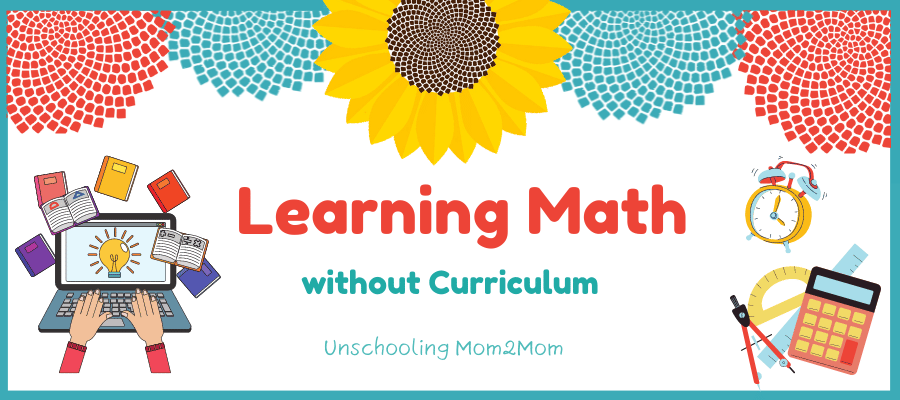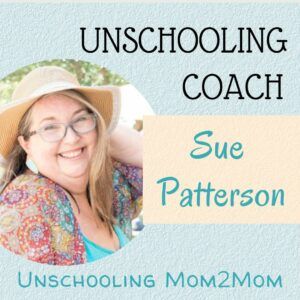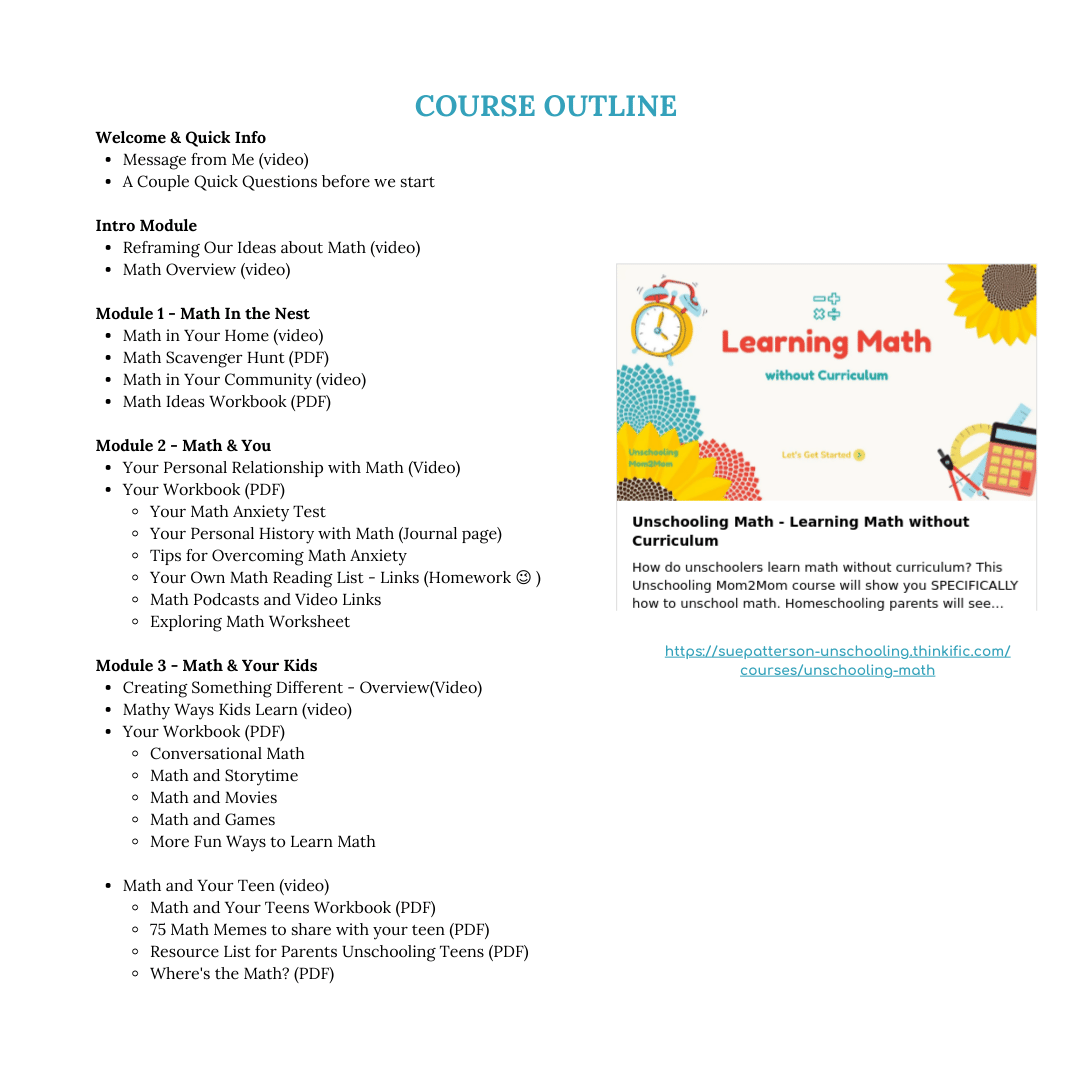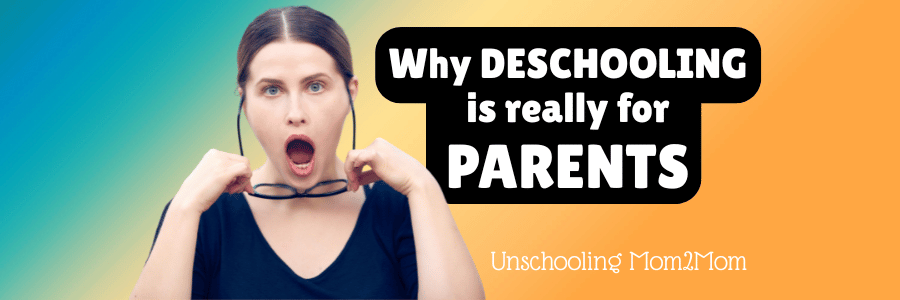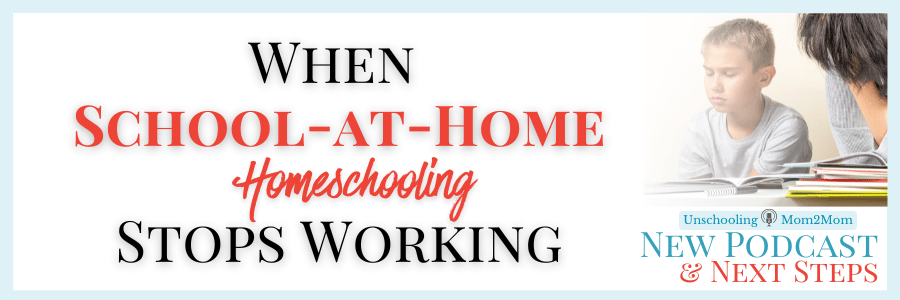How to Unschool Math Without Using a Curriculum
For years, I’ve heard parents say,
"I like unschooling - except we will need to use curriculum for Math!"
And then the quest begins: trying to find the Math curriculum that fits your child and their learning style.
You're just searching for one that doesn't lead to power struggles, or to everyone abandoning it and tossing it to gather dust on the shelf. Right?
Turns out, this is not an easy task.
Year after year, I hear homeschooling parents (usually moms) SO EXCITED about the math curriculum they’ve discovered.
But by about October of the same year, the bloom is off the rose. The appeal is nowhere to be found. They are OVER it.
So why are good math curriculums so elusive?
And yes, I’m aware of the incorrect use of the word. In the Regular World... the plural for curriculum is curricula.
But in the homeschooling world, we seem to use that word a little differently. Not only is definition of curriculum used a little differently than in other educational institutions, but it's used as both the singular and plural form of the word. I know, it doesn't matter to most people, but before people write to me, I wanted to
let you know that... I know.
But that’s what I want to talk to you about this week - Math Curriculum. And I want to give you some solutions!
I’m Sue Patterson and this is the Unschooling Mom2Mom podcast.
We’re starting up Season 3 tackling one of the hardest topics for parents - unschooling math!
I struggled with it to, so I know your pain.
But now that I’m on the other side, so to speak, with my own kids being 34, 32, and 29, I can tell you with 100% confidence:
Don’t waste your money on curriculum!
Here's Why...
Curriculum companies are geared for school settings. And school systems have adopted a scope and sequence they want to use to move the kids in their system through the entire 12 year process.
But you’re a family. Not a system. You can pivot the minute an interest shows up. You can shift to use real life opportunities to help your kids learn more about math. Practical, useful aspects of math.
If you’re thinking, “Not my kid. They resist if they catch a whiff of math.”
You’re left wondering why the kids resist in spite of the companies assuring us that their approach is "fun" or "exciting" or "sure to engage the kids!"
Maybe because it’s fun and exciting if all you have to have to compare it to is rote memorization or a teacher droning on and on at the chalkboard.
It’s not fun compared to the real world.
It’s not fun compared to whatever adventure your child has in mind for their day.
So I’d ask you to reframe that idea of them resisting math.
Kids resist SCHOOL MATH, not real life math.
Do they like to gather coins in their video games?
Do they play games and not even pause to separate the math from the fun?
Do they sort and measure and pour and tap out rhythms?
Math is everywhere. We’ve just been convince to wait for the curriculum to show us where it is. Even though in our real life, math is puttering around all over the place!
Hmmm… so maybe you wouldn’t have to be at odds with your child, if you could SEE the math that’s happening.
Maybe we think, “Come on. You need this. You just don’t realize it yet.”
Because that’s what everyone told you year after year.
But stop and think about what math you’re using in your adult life.
Have you done a lot of graphing sine and cosine? How about slope?
How about geometry theorems? Is your life easier because you know them?
I doubt it.
Remember when your teacher said you had to memorize all those math facts because you wouldn’t have access to a calculator all the time? Well, that wasn’t what happened at all.
Inevitably, at this point when I’m talking in a group, someone says they’re an engineer and they use higher level math all the time. And what if their child wants to grow up to be an engineer?
I get it. We don’t want doors to close for our kids because we took some “easy way” out.
But consider this.
If your child wants to be an engineer, you’ll have other signals of this. They’ll build… all sorts of things. They’ll be very logical and analytical. They’ll love creating strategies and systems. They’ll enjoy playing with math concepts, and together, you’ll help them find ways that are more complicated and fun for them as they’re growing up. They don’t need textbooks to do that. And, in fact, giving them textbooks too early can be really frustrating for them. Better to help them build their own pile of mathy life experiences.
And then when they’re older - say mid to late-teens - they can take some community college math classes to give names and explanations for what they’ve been playing with. They’ll have the maturity to see the connections. They’ll be excited for the more natural progression.
You won’t have closed any doors at all. In fact, they’ll have a huge pile of life experiences they’ll be able to hook those higher level math concepts TO.
So, that’s my response usually to the engineers in the room.
Let’s not do a one-size-fits-all approach to math, because they MIGHT become an engineer. Think about how many engineers you personally know. For me, not too many.
So the next question might be - so how do I do this when I was raised on the school approach to math?
Very good question!
And luckily, I’ve been talking to parents who have done this for decades now. I’ve been gathering information and explanations. See, I personally, am more like you than I am my engineering friends. I didn’t think I was good at math. I got through Algebra 2 by the skin of my teeth. It gave me all sorts of hang-ups about math. All because of the way it was taught.
When I listened to the unschooling parents who loved math, I discovered all sorts of things.
Mainly that they believed the school approach to math to be all wrong.
They believed that that approach was what made us a nation of math phobic people.
I mean, most of us had math for at least 12 years. You’d think we’d be super competent and confident about it. But most of us aren’t.
And that fear is what makes us search high and low for SOMEONE ELSE to teach our kids about math. We bought into the idea that WE were to blame, and not the school approach. So we don’t feel particularly competent or confident in our ability to help our kids learn math.
BUT! That’s where you’re wrong!
You are quite competent in your adult life. YOu’re using math in ways that you’re not even noticing. Sure, no quadratic formulas - but if you needed them daily, you’d have figured it out. Or you’d go to YouTube to see how someone can explain it to you. Most of those things that poked holes in our confidence aren’t needed in our regular lives!
Remember when we asked, “When are we going to use this?” and the teacher couldn’t really respond?
And now our kids are asking us the same questions, and we’re thinking, “hmmm… because you have to?”
It’s like I mentioned in the last podcast, everyone was on this conveyor belt. Don’t ask questions, just keep it moving.
And unschoolers have decided to get off that conveyor belt.
To stop putting the system before the learner.
Instead of forcing the child through the curriculum - that isn’t really related to much in their lives - let’s take the unschooling approach and start with The Learner. Yes, even for math!
5 Action Steps for Reframing How You Approach Math
1. Go on a scavenger hunt and find the math in your homes and communities.
They’re right there in your hobbies, in health and wellness, in cooking, in decorating, in sports. Challenge yourself to find 50 ways math is showing up. Even doing this as an exercise will begin to free you from the old ways of seeing math.
2. Listen to hear if you speak negatively about your own abilities with math. See if you can identify examples where it isn’t true. Examples of ways you’re using math without any problems.
3. Watch movies and read books with math concepts.
You may already be doing this, but not aware of it. Or… you may be avoiding them because we often subconsciously move away from things we think we don’t like. Make a deliberate effort to move in this direction.
4. Play more games with the kids. Dice, cards, counting, strategizing...
these are all ways of playing with math concepts.
I have a free PDF for you with specific ideas - it’s a page from one of the workbooks in my new Unschooling Math course.
Because that leads me to...
5. Take my
Learning Math Without Curriculum Course. You’ll be so glad you did! I know you’re tired of wasting time, energy and MONEY trying to find a math program that will work.
Through the videos and workbooks in this course, I’ll walk you through all these concepts I’ve mentioned in the podcast, going into depth to help you see where the math is hiding in your lives. I’ll give you journaling pages to help you see why you’re struggling so much with math - and solutions for how to break free from your own math insecurities.
I include lists of movies and books, games and ideas to help you create a truly math literate environment.
INCLUDING a section devoted to Unschooling Math for Teens - yes! Without a curriculum!
I have 25 years of information to share with you!
Once and for all, you can stop the search for the perfect math curriculum. It's actually right there in your home already! You, your child, your home and community - all the tools and opportunities are right there! You just have to remove the fear and see through your new math lens.
The Learning Math without Curriculum course will help you do exactly that!
I'd LOVE to show you
how you can unschool math!
OK, that’s enough for this week.
Reach out if you’re looking for other unschooling resources that i can help you find. Join us in the
membership group if you need more support. Oh! And they get big discount codes (50% off!) on all my courses... so that may be something you want to consider.
Go on that Math Scavenger Hunt in your house and let me know if you find more math concepts than you realized were there !
Enjoy your kids and I’ll be back to talk with you again next week. Happy Unschooling !


